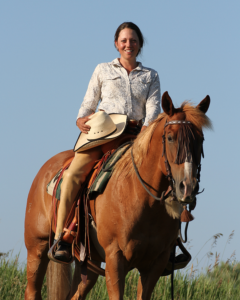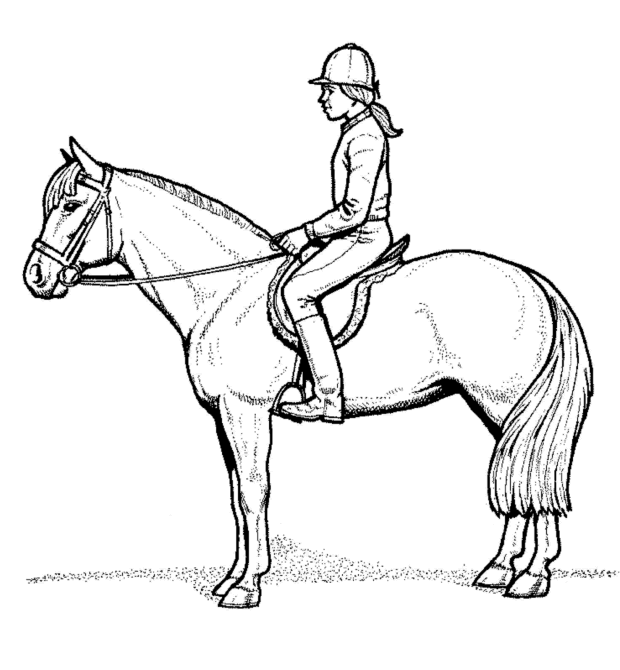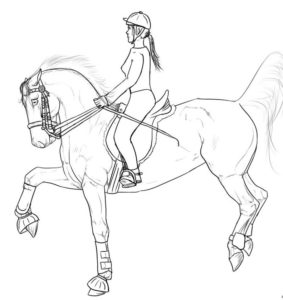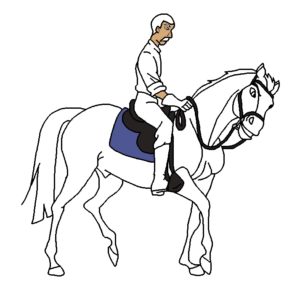
Amy Skinner
Editor’s Note: Amy Skinner is a regular guest columnist and has been a horse gal since age six. She works with owner/operator Jim Thomas as a trainer at Bar T Horsemanship where she rides and teaches English and Western. She also maintains Essence Horsemanship. Skinner has studied at the Royal Andalusian School of Equestrian Art in Spain, with Buck Brannaman, Leslie Desmond, Brent Graef, and many others.
Meet Skinner and Thomas at the Best Horse Practices Summit!
Here, Skinner shares some notes on horses and riders. Read Part I of Freeloading
Skinner writes:
When people bring me a horse and go right to name calling right away, my heart sinks. I regularly hear people regularly call their horses:
- lazy
- stubborn
- uncoordinated/clumsy
- unathletic
- moody
 When I hear these things, though, what I really hear is that rider’s own personality flaws. They may be telling me that:
When I hear these things, though, what I really hear is that rider’s own personality flaws. They may be telling me that:
- they are ignorant to the horse’s real nature
- they tend to humanize their horse
- or, that their ego gets in the way of finding the best ways to work with their horse.
I like to give riders the benefit of the doubt and consider that they are on a journey of learning. They are frustrated because the horse won’t cooperate in some way and they don’t understand why and don’t have the tools to work through the problem. Consequently, they resort to name calling.
Folks hear me talk about ego, conflict, and nod in agreement, as if those faults applied to other riders, not them. But we all struggle with our egos.
 For example: My ego makes me crave recognition for my work, and I have to be careful that I don’t let it get in the way. I don’t want to satisfy my ego at the expense of the horse, by pushing it in a direction they’re not ready for just to look like a better trainer.
For example: My ego makes me crave recognition for my work, and I have to be careful that I don’t let it get in the way. I don’t want to satisfy my ego at the expense of the horse, by pushing it in a direction they’re not ready for just to look like a better trainer.
I have to be careful not to attach my self-worth to a student or feel that their riding ability is a reflection of my own.
We all have our struggles. Having an ego isn’t a bad thing, but we need to be aware of it so that it doesn’t interfere in our horsemanship.
Let’s assume that if you’re reading this article, you’re seeking real horsemanship and not wanting to achieve “success” at the horse’s expense. If we really want to figure out why we run into problems with our horses, we need to change the labels we put on them and maybe change the habit of labeling altogether.
- ‘Lazy’ could really mean the horse is unresponsive.
- A ‘stubborn’ horse could just be confused.
- A ‘clumsy’ horse is off balance.
- A ‘moody’ horse could be frustrated.
When we consider these behaviors, we first need to look at ourselves. If the horse is unresponsive, how have we taught him to ignore our cues and messages? How can we help him understand that our aids have meaning? How can we nurture when and how he responds to them?
 Often, the rider doesn’t realize her hands and legs create so much noise for the horse. Then, when they really want their leg to mean something, the horse has tuned it out, the same way that we do at a restaurant with background chatter.
Often, the rider doesn’t realize her hands and legs create so much noise for the horse. Then, when they really want their leg to mean something, the horse has tuned it out, the same way that we do at a restaurant with background chatter.
Or, the horse could have been dulled down by other riders. Now, you need to help him understand that what you ask has meaning, and that you’d like him to respond to lighter cues.
Either way, it’s human error. It’s our responsibility to make things clear and easy for the horse to grasp so he doesn’t get frustrated or tuned out. It’s our responsibility to help him be balanced.
Horses want to get along. They want nothing more than to find peace and know what their role in our lives is. If we want to be fair, decent horsemen and women, then we need to drop the name-calling and start looking at ourselves.
Amen! Very well written and worthy of attention by all involved with equines! Sharing this one far and wide! Thanks Amy!
So true …..so right …..and I deal with it all the time in my teaching and training……communication is first about listening than understandings before resounding ….no different with horses…..and they talk loud and clear ……for all the reasons you mentioned riders more often than not can’t hear because their listening is filtered through the ego not the true self…ego always distorts things…..Thanks for your wise and kind words for the horses sake?
Well said. Whether horses or people trigger us to call them names or blame them…we better take a look at ourselves. Lovely written!